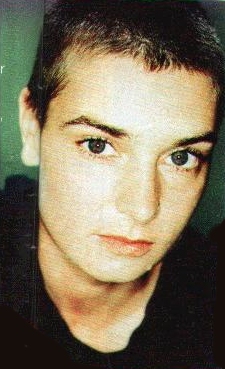
The Times
July 1, 2000

Sinéad O’Connor has overslept, which means that we have unexpected company. She should have taken her beautiful, laughing, gap-toothed four-year-old daughter Roisin to nursery school, but the alarm failed to go off. As a result, when we arrive mid-morning, Roisin is ensconced in the middle of the spacious living room of O’Connor’s rented fourth-floor Dublin apartment watching a Teletubbies video. Toys are littered all over the vast, pink Chinese rug that covers the pol-ished wooden floor, and she demands that I watch with her while her mother makes tea.
In truth, O’Connor is rather glad to have missed the school run. She’s just spent two weeks away in America promoting her new album Faith and Courage, and mother and daughter are relishing their time back together. Later, when we sit in the kitchen to talk, Roisin objects to being left out, and so we transfer to the living room and continue with Laa-Laa, Po, Tinky Winky and Dipsy for company.
Political agitator, tabloid target, pop star, mother and now priest, Sinéad Mother Bernadette Maria O’Connor, as she has been styled since her ordination last year, has already played a bewildering number of roles in her 33 years. And most of them have been controversial. Although she hasn’t made a new album since 1994, she has seldom been out of the headlines. Suicide attempts, lurid speculation about her sexuality, joining the priesthood, shopping Shane MacGowan to the police and a bitter custody battle with Roisin’s father, the Irish journalist John Walters, are just some of the extracurricular tales that have served to keep her in the public eye. Few stars have con-ducted their private lives quite as publicly as O’Connor.
With her new album. already critical acclaimed as the best she has ever made, she hopes she can put behind her the controversies that have dogged her career and he recognised first and foremost as an artist and the proud possessor of one of the most powerful, emotional and distinctive voices in contemporary rock.
“I’d like to get away from being overshadowed by other issues,” she says and fixes me with an extraordinary stare that is both innocent and knowing at the same time. ‘I know that’s often been my fault and it was down to my naivety about what it is OK to talk about in public and what is too personal. But now I’d like permission just to be an artist and to sing.”
Yet if that was meant to be the strategy, she scuppered it even before the new record reached the shops, hitting the headlines again last month with an interview in which she came out as a lesbian. “I know I’m too open for my own good. I’m stupid. I didn’t have to talk about it. But on the other hand why shouldn’t I? I’m not ashamed of it. I could have not answered the question. But there’s a strong part of me requires me to be honest at all times. I refuse to live my life in secret."
This seems to encapsulate the paradox of O’Connor’s rela-tionship with the media and celebrity. On the one hand, she cannot seem to resist the outrageous quote and the provoca-tive soundbite. On the other, she has an almost pathological fear of being misunderstood and misrepresented.
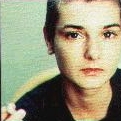
Three years ago, following the last occasion we had talked, she rang me at home at half past midnight to thank me for the interview, claiming it was the “least threatening” she had ever done. When I asked if she usually found encounters with journalists difficult, she replied that she had often been physically sick after them. There were further edgy, nervous phone calls in which she rang to clarify or amplify things she had said.
Now she claims to have found a new equilibrium in her troubled life, based on what she calls the “holy trinity” of “my children, my singing and my priesthood”. Her return to the land of her birth some 14 years after she first left is symbolic of what she sees as a healing process in which she has finally learnt to set aside the anger which once consumed her.
As we talk we overlook St. Patrick’s Cathedral from her bal-cony window. The certificate marking her ordination last year is framed on the wall above us. So, too, is a picture of her dressed in her priest’s robes with her bishop.
Her return to Ireland was enforced by the terms of the set-tlement of the custody battle with Waters, who also lives in Dublin, and the apartment she recently moved into resembles a student flat rather than the home of a millionaire rock star. Above the mantelpiece is a framed picture of Bob Marley. flanked by two pictures of Jesus. On another wall a painting of The Last Supper shares pride of place with the cover art of the Wailers’ Survival album. Her bookshelves contains several bibles, A.N. Wilson’s biography of Jesus, and various the-ological works, alongside a copy of the Koran and the Zohar as well as The Woman’s Encyclopedia of Myths and Secrets.
There are piles of CDs on the floor, mostly reggae and Irish music. But there are also no fewer than three box sets of the recordings of Frank Sinatra, who once publicly exco-riated O’Connor after she had refused to perform in America if they played The Star Spangled Banner before her shows. Two guitars are propped up against the wall, one of them decorated in the Rastafarian colours of red, green and gold.
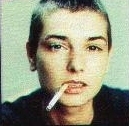
She’s as candid as ever when it comes to talking about sex, religion, therapy, relationships and motherhood, hut not unreasonably she wants to begin by talking about her music and the new record. She describes Faith and Courage as her “trying not to die” album, made at the height of her difficul-ties over the custody case. The worst moment was when accusations were laid that she was neglecting her daughter. They were found to be without foundation, but there was a reported suicide attempt and at one point she temporarily and voluntarily gave up custody.
“The songs aren’t about that,
but it was going on while I was recording. If you are involved in a fight
like that your self-esteem is bound to be very low the album was about
saying that there could be life after everything I had gone through. I
was healing myself and getting my spirit hack, I thought I was as weak
as a rabbit. But my soul started singing to me that I was stronger than
I thought."
The new songs touch on many of her most familiar themes. No Man’s Woman is a fierce hymn of female independence that has offended some as being anti-male. Conversely, Daddy I’m Fine declares “I wanna f___ every man in sight:’ Most cathartic of all is Hold Back the Night, a song written by Bobby Blue for a TV movie about a young woman who prosecutes her father for sexual abuse. O’Connor has graphically described her own abuse at the hands of her moth-er, who died in 1985. “Do you want to be my dying day? My darkest hour? My overdose?” she sings, pouring her entire being into the lyric with an intensity that makes the hairs on the back of your neck stand on end. “I identified hugely with the subject matter. Only someone who has been to those depths could sing that song. It sounds big-headed, hut I think I’m the only person in the universe who could have sung it,” she says.
The Lamb’s Book of Life is another personal manifesto of a song, in which she describes her belief in God and the power of prayer. It also contains the line, “Words can’t express how sorry I am if I ever caused pain to anybody”, apparently a ref-erence to the single most controversial incident in her career when eight years ago she ripped up a picture of the Pope on American television. The storm of outrage effectively caused her to flee America. and she gave her £500.000 house in Hollywood to the Red Cross. Three years ago she told mc that under no circumstances would she ever apologise . If the Virgin Mary was alive she’d be ripping up pictures of the Pope,” she had told me. Has she changed her mind? Her voice is soft and quiet but the words come tumbling out. ‘I’m not apologising for anything I did, but I’m apologising if what I did hurt people. That’s a major differ-ence. It was very necessary for me to do what I did to stay alive. But I’m sorry if it caused pain to my family. I’m proud of that girl I was and I love her. But I was very young and I was acting instinctively. I don’t think I was hysterical but I was very stress-ridden,” she says.
She has learnt the importance of respecting viewpoints contrary to one's own, she says. “If you want to be heard you have to make your point calmly; and I was so full of rage and anger I didn’t do that. The way I have put things in the past has distorted the..." At which point Roisin interrupts to demand something to eat.
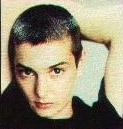
O’Connor was born in December 1966 in the Dublin suburb of Glenageary. Her father John was a barrister, but her parents separated when she was eight. She and her older brother, the writer Joseph O’Connor, went to live with their mother, a disturbed woman who heaped considerable vio-lence on her children’s heads. When she was 13, John O’Connor won custody of his daughter. It is no surprise to learn that Sinéad became a deeply disturbed adolescent, and after being caught shoplifting she was sent to a special school for girls with behavioural problems. She ran away, and after a brief spell singing in Dublin bars, she upped and left at 18 for London, married fellow musician John Reynolds, gave birth to her son Jake and signed a major record deal.
By 1990, her spectacular version of the Prince song, Nothing Compares to U, had taken her to the top of the charts in 16 countries and the accompanying video, which featured stark shots of her shaven head with a single tear trickling down her cheek, was equally memorable. Yet success seemed to bring nothing but trouble. She had an abortion, separated from Reynolds and became as famous for her stridently expressed views about religion and politics as for her music. The Sun branded her a “she devil” for her opposition to the Gulf War, and after the incident with the Pope’s picture her records were ceremoniously burnt in America and she was booed off stage. She suffered a breakdown and visited a London thera-pist who specialised in treating victims of past child abuse every day for four years.
Today she says she has “grown away” from the anger that once drove her, but feels trapped by an audience that wants her to stay angry and miserable. “The rage was righteous and there were just reasons for it. but I’ve expressed it and pukcd it out,” she says. “You can’t get over it, you have to get through it. I was exploding and it had to all come out. But I’ve learnt compassion through great suffering. It’s a growing experi-ence and I want people to know I’ve moved on.”
She still calls her therapist “every now and then when I’m up over something”, but claims no longer to need it. She describes a dream in which she is in a lift and there are two floors, one leading to the bright and sunny uplands and the other to a bleak, rainswept landscape. In the dream she consciously decides to get out on the sunny side. “I wouldn’t wish it on a dog to feel the way I did all those years. I don’t want to be lambasted and beaten up and treat-ed like slit, which I feel I was. I’m now trying to protect myself. I don’t want to cause trouble and I don’t want to hurt people or hurt myself:"
Her shrink once told her that she would know she was get-ting better “when you just have ordinary human sadness rather than being overwhelmed by terrible grief and torture”. That’s where she feels she is today. “You can’t get to a situation where you never have pain, but I’m not tortured or in grief any more,” she says.
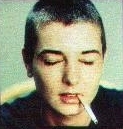
Her solace has come from a return to the church. In April last year she was ordained as a priest in the Tridentine order of Mater Dei, and has since been promoted to an archdea-con. The order is not recognised by the Catholic church and continues to celebrate mass in the traditional Latin form abandoned by Catholicism after 1965. This apparently bizarre turn of events in her life came about when she announced casually on Irish television on Gay Byrne’s Late Late Show that she wanted to be a priest. Most regarded it as a joke. But Bishop Michael Cox took her seriously and called the programme. Six months later she was ordained. O’Connor insists it was not some dramatic conversion but a logical step. “I was quite pious as a child. I prayed a lot and I could feel a presence when I did. I always knew that God was there despite religion, and I’ve always been interested in rescuing God from religion. I would have been a nun only I could not stand the idea of not having sex"
She likes to call herself a “solider of magic” as much as a priest. “Catholicism has hidden a lot of the magic of God. The priests in Ireland are so boring and don’t inspire anyone. But I could always see the magic they were trying to hide. If it had been open to women I would have wanted to be a priest:’ To date she hasn’t conducted masses or baptisms in public because she says it would turn into a media circus. “So I do it privately. Most of the work I do for them is financial. I give a lot of money, which doesn’t make me a good priest. My priesthood is my music. That’s where the healing is. And because I have two kids the understanding is that I’m still learning and training.”
But having spent years railing
against the church for its anti-abortion and anti-gay stances, how does
she now reconcile her-self to the priesthood? She explains that it’s a
relatively enlight-ened order which ordains not only women but married
and gay priests. “They have some right-wing views, but they’ve changed
their attitude to homosexuali-ty since they’ve known me. I’ve helped them
to be a bridge to younger people and their love and knowledge of me has
helped open their minds. I think they are anti-abortion, and I have to
respect that’s how they feel although I’m pro-choice. But they’re not locked
in old ways
of thinking. They are prepared
to move and change.”
She resents the suggestion that the order is a strange cult and she is not a proper priest. “Ordination is a magical ceremony and you can’t say it’s not legal or valid. If God calls you then you can’t say no just because some other human being says no, even if that man is a Pope. I’d crawl over cut glass to do this:’ The reaction from the Catholic church to her ordi-nation has been muted. “They seem to have adopted the attitude that if I don’t f___ with them they won’t f___ with me. The Vatican’s only statement was it was nice to see someone who wanted to make a spiritual life. But I’ve had a lot of letters from priests over the years thanking me for rattling the bars of the cage. I’m trying to help them into new ways of thinking so I don’t go around dissing them and sticking two fingers up. I’m not their enemy. But God works in some very funny ways:’
She also describes herself as a Rastafarian (a 20-minute reggae track by Lee Scratch Perry was played at her ordina-tion at Lourdes) and claims to be a psychic medium, having trained for the last two years at the College of Psychic Studies in London. “I don’t work professionally yet, but I practice on my friends. To deal with dead people and talk to people and tell them something their dead relatives have said which fills them with huge joy is better than therapy.”
She denies any conflict between being a priest and practicing her psychic powers. “Although the priesthood say they don’t believe in mediumship that’s really what they are doing. Priests are calling the spirit of Jesus into the room she insists.
Her new-found mission to save souls has already led her into further deep. Last year she shopped the singer Shane MacGowan to the police over possession of hard drugs. Such behaviour is not part of the rock’n’roll code and it caused a lot of resentment in certain quarters. She is unre-pentant. “I love Shane and I know he’s very angry with me. I suppose he’s every right to be. But I’m not at all sorry for what I did. It was done for concern for him and in anger that four people have died around him. He has now been cau-tioned, which I’m very pleased about because it means the police have got their eye on him. It might save him.”
Then there is her sexuality. Despite her recent claim to being a lesbian, she now says the truth is more complicated. “I’d given another interview saying I was more attracted to men, and a woman who I had gone out with a while ago took my statement as an insult to her. So I over-compensated and said I’m a full-on lesbian, which I’m actually not. I’m bisexual. “But if I’m in a relationship with a woman and I walk down the street with her then it is going to he all over the papers any-way, so I may as well out myself so I can live an open life. I don’t have any problem with people knowing about my sexuality.” In any case, she adds, she is considering the notion of celibacy. “That could be part of my calling as a priest. If it’s voluntary, then celibacy can be very powerful.”
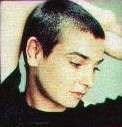
One thing she won’t be doing in the foreseeable future is per-forming live. “There’s no more touring because I’m now bound by court orders over my daugh-ter. I have to be here and my career is pretty much controlled by my daughter’s father and the circumstances I’m in. But it’s all been resolved rather beautifully. We came to a good understand-ing of each other’s predicament. We share joint custody and I was cleared of any bullshit allegations that were made. It’s working out well.’ The downside is that in moving to Dublin to live with her daughter she had to leave her 13-year-old son Jake in London with his father. "We have to commute to see each other and I wasn’t quite ready for that. But when they are that age you have to let go and allow them to make their own decisions. Kids are different these days, and he finds Dublin very dull and didn’t want to come.
She has immersed herself in domestic life and child-rearing and refuses to have a housekeeper, nanny or even a cleaner, as if she feels she has to prove that she can do it all on her own. But she admits to feeling tired. “If you’ve got to get up at 7am then you have to be in bed by 10pm else you’re screwed. It’s mad trying to get Roisin up and out in the morn-ing. I seem to be permanently exhausted. But I remember my parents telling me that’s what being a grown-up is about.”
Tired, but apparently happy and contended. The sunny days are outnumbering the rainy ones, and she has just made her best record in years. But with O’Connor you always sense certain fragility, a feeling that the storm clouds aren’t far below the horizon. Hopefully this time the weather is set fair, and after the years of depression, breakdowns and suicide attempts she has never sounded more optimistic about her life.
“The difference is that now I know what I’m fighting for,” she says as we sit on the floor building a pirate boat with Roisin “And I’m no longer just fighting. I’m winning”
<<< BACK TO ARTICLES